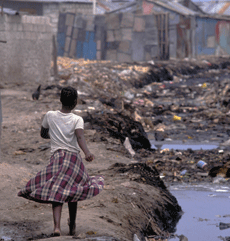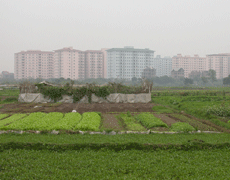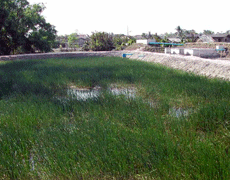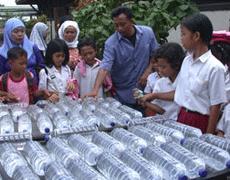
Improved Environmental Sanitation
Safe drinking water and adequate environmental sanitation are preconditions for health and for success in the fight against poverty, hunger, child deaths and gender inequality. They are also central to the human rights and personal dignity of every human being. Globally, the World Health Organisation (WHO) estimates that 1.8 million people die each year from diarrhoeal diseases, 200 million people are infected with schistosomiasis and more than 1 billion people suffer from soil-transmitted helminth infections. The adverse impacts of poor environmental sanitation can extend well beyond the direct impacts on health. Health risks and epidemics from waterborne diseases can greatly reduce tourism and agricultural exports, with economic costs much greater than the cost of investments in water supply and sanitation to address the problems.
The International Drinking Water and Sanitation Decade (IWSD), with all its achievements, made limited impact on improving water supply and sanitation services for the urban poor. A key lesson from the Decade is the need to respond to consumer demand to achieve sustainable and effective change.
NCCR North-South research on environmental sanitation follows three basic objectives:
1. Identify determinants for improving environmental sanitation services in urban and peri-urban areas, taking into account the dynamics of social systems.
2. Assess the potential to reduce vulnerability and increase resilience of urban and mobile poor populations through improved environmental sanitation services.
3. Testing of alternative methods for improved environmental sanitation planning.
RESEARCH PROJECTS

Household-Centred Environmental Sanitation Approach
The Household-Centred Environmental Sanitation (HCES) is a novel approach to environmental sanitation based on the understanding that development can only be sustainable if people play a central role in the planning, design and implementation process. In relation to environmental sanitation, this requires a radical change in the attitudes of professionals away from mere service provision towards participatory and locally adapted service creation. HCES is based on the Bellagio Principles focusing on human dignity and quality of life, involvement of all stakeholders in decision-making, waste to be considered as a resource with maximum use of recycling and reuse potential, and problems solved as close as possible to where they occur. In 2007/2008 the approach will be field-tested in selected cites in Kenya, Tanzania, Burkina Faso, Costa Rica and Lao PDR, focusing on un-serviced or under-serviced areas in urban and peri- urban settings, as environmental and health problems are highest in these disenfranchised communities.
For more information, please contact:
Christoph Lüthi

Quantitative Microbial Risk Assessment and Material Flow Analysis
Material Flow Analysis (MFA) and Quantitative Microbiological Risk Assessment (QMRA) are methodologies applied to identify the extent of chemical and microbiological contamination (pathogens) in a specific system and its impact on human health. A (new) holistic approach combining both methodologies for identifying sustainable environmental sanitation services is being developed that balances the needs of the people (health and well being) with those of the environment (ecology). Furthermore, the MFA methodology is applied in urban areas and on watershed level to evaluate environmental sanitation improvement strategies.
For more information, please contact:
Nguyen Viet Hung,
Narong Surinkul,
Monika Schaffner, and
Agnes Montangero

Improved Management and Treatment of Domestic Wastewater and Feacal sludge
The potential and limitation of different wastewater (including greywater) and sludge management and treatment options is being evaluated. Projects look at technical, economic and governance issues, such as management and institutional requirements.
For more information, please contact:
Kone Doulaye,
Antoine Morel, and
Thammarat Koottatep

Dissemination of Innovation in Environmental Sanitation
Diffusion of innovation as a process contains different stages over time, depends on social norms and criteria of the innovation itself. NCCR research examines how behavior determining factors can be influenced with which intervention method in real life settings to effectively promote innovation in the field of environmental sanitation.
For further information, please contact:
Prof. H.J. Mosler
CONTACT
Roland SchertenleibSwiss Federal Institute of Aquatic Science and Technology (EAWAG), Switzerland
Antoine MorelSchool of Environment, Resources and Development (SERD), Asian Institute of Technology (AIT), Thailand